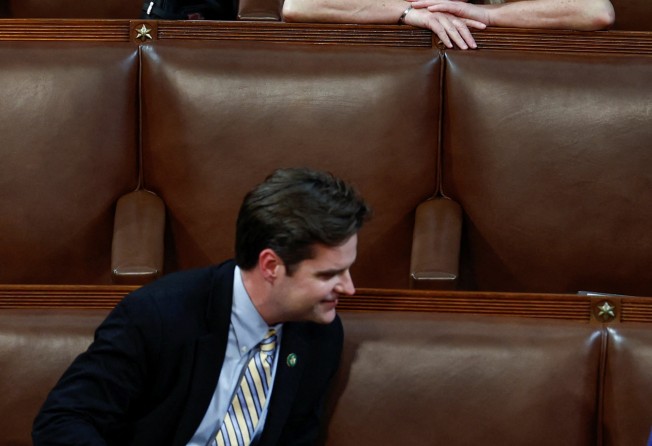
With China in US Congress’ cross hairs, brace for more anti-Asian hate
- A new select committee on strategic competition with China means we can expect testimony about the threat Beijing poses to stream endlessly from congressional hearing rooms
- This could have a deadly impact on ordinary Chinese and Asian-Americans, very few of whom have any connection to the government in Beijing

With the 118th US Congress now in full swing, representatives Judy Chu and Ted Lieu – along with countless others fighting anti-Asian hate – will need to put in more overtime.
We know from the first days of the new House session that hostage taking has replaced horse trading to get work done, as the Republican Party’s Freedom Caucus managed to undermine the authority of incoming speaker Kevin McCarthy. This manoeuvre was not supported by most Republicans in the chamber, but their knives were no match for the guns of their far-right colleagues.
The triumph of the far-right flank, led by Ukraine-aid critics like Georgia Representative Marjorie Taylor Greene and Florida Representative Matt Gaetz, in devolving the power of the House speaker before allowing McCarthy to pick up his gavel, occurred just before former Brazilian president Jair Bolsonaro’s supporters ransacked his country’s seat of government.
Imagine how delighted Greene and Gaetz must have been to see their ideological brethren run amok in South America’s most populous and economically powerful country, as their Freedom Caucus prepared to investigate those who investigated America’s January 6 insurrection.
Theirs will be an odyssey of vengeance, and it’s clear that anything relating to China is in their cross hairs.
After the spectacle of the Republican Party’s internal disarray and the attack in Brasilia, the House established a select committee on US-China strategic competition as one of its first items of business.
More than half of the chamber’s Democrats went along with the plan, which isn’t surprising. Looking weak on China is extremely risky for any politician, given the American public’s attitude towards the country.

Those perceptions didn’t arise from nothing. The Chinese government’s policies under President Xi Jinping – the militarisation of islands in the South China Sea, the mass internment of Uygurs and other Muslims, cyber-espionage convictions and an acerbic “wolf warrior” approach to diplomacy to deny or defend all of it – compelled Washington to take Beijing’s tactics more seriously.
Why didn’t some House Democrats see the need for a new committee tasked with investigating them? For starters, Congress already has the US-China Economic and Security Review Commission and the Congressional-Executive Commission on China.
Both bipartisan bodies, including members sanctioned by the Chinese government, preside over extensively researched reports detailing the threats posed by China. And they don’t pull punches. In its latest annual report – a 785-page document – the Economic and Security Review Commission recommended a suspension of normal trade relations with China.
Around the same time, the Congressional-Executive Commission issued a report on how enforcement of the national security law that Beijing imposed on Hong Kong in 2020 has “dismantled” the city’s civil society.
Meanwhile, there are many other US government departments and agencies presenting evidence of Chinese transgressions and taking action. US Customs and Border Protection, for example, raised an alarm earlier this month about imports from Xinjiang, alleging that Chinese firms are hiding the origins of goods made there.
The US Justice Department pulled off “an unprecedented extradition” of a Chinese intelligence official and sentenced him to 20 years in jail for attempting to steal trade secrets from GE Aviation and other US aerospace companies.
These efforts to identify threats emanating from China require determination to limit the deadly impact that they can have on ordinary Chinese and Asian-Americans, very few of whom have any connection to the government in Beijing.
It is for this reason that the US Justice Department ended its “China Initiative”, a damaging name applied needlessly to work that was already being done effectively to fight espionage and intellectual property theft, and which helped fuel the misperception that anything Chinese is suspect.
This almost certainly contributed to a surge in reported cases of hate incidents that has mobilised the Asian-American community to call on politicians to stop anti-Asian rhetoric.
But the Republicans’ Freedom Caucus has made divisiveness their objective, so now we can expect testimony about the threat China poses to America to stream endlessly from congressional hearing rooms as they try to portray Beijing as the biggest threat to Americans after President Joe Biden and the Democrats.
Stay tuned long enough and we’ll probably see the new House China committee haul Robert Hur, the special counsel charged with investigating Biden’s troves of mishandled classified documents, in front of its chairman Mike Gallagher on suspicion of working for China.
He might be of Korean descent, but in the throes of the coming yellow peril zeal in the House, that might not matter.
Robert Delaney is the Post’s North America bureau chief
